9 Sports to Try to Help Kids Stay Active Throughout the Year
From the discipline of jiu-jitsu and the accuracy of archery, to the teamwork of football and the balance for mountain biking, every sport brings with it challenges and opportunities for skills development.
The more sporting experiences a child is exposed to, the more likely they are to find an activity they will enjoy and want to pursue. All while keeping active, improving physical literacy, developing communication skills, improving mental health and making friends.

Summer is the perfect time to try something new
In warm weather, long summer days are ideal for recreational sporting pursuits, especially during the school holidays.
Whether it’s an afternoon whiled away at the local park to play five-a-side or hitting the beach for a spot of beach volleyball, opportunities are plentiful for enjoying some new fun sports.
Multi-activity holiday camps are another great way to play different sports. Timetables often change daily and children can expect to encounter a diverse range of activities which can include sports such as martial arts, dancing, softball or gymnastics.
They may also choose to sign up to a local gym or local club where they can practice their chosen sports year-round.
The key is to get involved, join in and give new activities a go. The more fun sports and activities a child experiences, the better chance they stand of keeping active all year round.
Why handball is the best sport for kids to try this summer
After the first few games of handball, it’s easy to see its appeal.
Handball is an amalgamation of other sports such as hockey, basketball, netball and football, and presents a wide range of physical and mental challenges. It’s a great way to offer a fresh slate for children who don’t enjoy traditional sports or school PE activities.
For young children, handball promotes movement, throwing and catching skills, plus it develops teamwork and communication. It also teaches resilience, problem-solving and competition.
“Handball seems to avoid the stereotypes or preconceptions that are attached to some of the more conventional team sports.
Teamwork is more important than physical skill in this game, so by being inclusive it has huge potential to inspire a wide range of children, irrespective of their sporting experience.”
Laurence York, Head of Partnerships at Premier Education
Find a local sports club and enquire about taster sessions or community handball teams. Learning the foundations of the sport over summer presents a super opportunity to immerse your child in a popular and upcoming new activity before winter comes around.
Make a splash with swimming
There’s no doubt that swimming is great fun for kids of all abilities.
It’s brilliant exercise and no matter whether you’re with a local club, family or friends, it helps to encourage water confidence, builds strength and will improve the fitness level of your child.
Stamina, endurance and discipline are important skills nurtured through swimming and in the school holidays, it’s the perfect time to seek out local leisure centres or lidos where your kids can give it a try.
Pools are open year-round and virtually all public pools are heated so it’s the perfect new sport to adopt year-round.
If your child adores their time in the water or could do with some help learning how to swim, sign them up for lessons where they can develop their technique and grow in confidence in a safe and supportive environment.
Take on two wheels with cycling
There’s a lot of fun to be had on two wheels! Bike riding along local cycle routes or byways, or mountain biking in the countryside is great exercise and thoroughly enjoyable for children of all abilities. What’s more, once you’ve invested in a bike and helmet, riding is free!
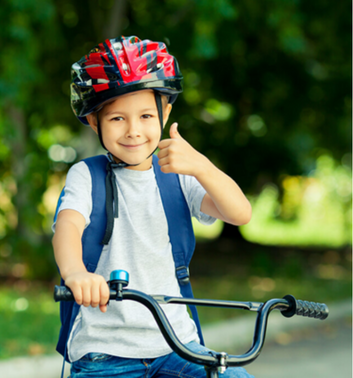
Cycling provides a brilliant workout for the muscles in the legs and builds cardiovascular fitness, as well as acting as a fantastic stress buster!
Safe cycling is a great skill to master at a young age as it provides an activity which can be enjoyed for the rest of that person’s life. Once confident on two wheels, children can cycle to school and get around without having to rely on vehicles (good for the planet too!) It’s a physical activity that can be more challenging or competitive for those wanting to get into the sport more seriously. It can be enjoyed whatever the weather, plus cycling contributes to the 60 minutes of daily physical activity recommended for children.
Golf (and its variations…including frisbee golf!)
You’d be forgiven for overlooking golf as a sport for young children to participate in.
But it’s superb for strengthening the spine and core muscles, promoting balance and improving hand-eye coordination. It also encourages resilience, analytical thinking, self-discipline and concentration.
Golf is an excellent entry-level activity for children who don’t ordinarily play sports or prefer non-contact sports.
Tri-golf is a fun alternative version of golf, designed specifically for primary school children to play. It’s a more energetic version of golf and enables children to take their first golf shots safely, forming a good golfing foundation for those who may choose the pursue the sport later in life.
Played with plastic clubs and rubber balls, the aim of the game is to hit shots at bright, colourful targets that can be attached to the floor or wall.
Or frisbee golf (think ultimate frisbee) is another emerging variation of the sport which is played with a frisbee instead of balls and clubs. Rather than hitting a ball into a hole, players throw a flying disk into a metal target. As new sports go, this one offers an exciting and challenging game which is fun for all involved!
Step into the cricket pitch
Cricket is a game which has been known and loved across the planet for decades. Like football or volleyball, it inspires great team spirit while improving a range of skills such as throwing, overarm bowling, batting catching and running.
For young children, an after-school club is the perfect environment to learn the basics of the game. Rather than focus on full matches, the club will break sessions down into smaller fun activities which focus on getting everybody on their feet and joining in.
Although traditionally a summer sport, cricket can be played throughout the course of the year in sports halls within schools. Skills learnt in cricket can easily be transferred to other games such as baseball.
Get in the Groove with Dancing
Whether it’s breakdancing, street dance, ballet or tap, dancing comes packed with benefits:-
- Improves muscular strength and endurance
- Improves agility and flexibility
- Promotes good balance and spatial awareness
- Great for teamwork
- It’s creative expressive
- Relieves stress and anxiety
Dance groups can be popular and get overly subscribed so pop your child’s name down on a waiting list as soon as possible. Courses run all year round so kids stay active whatever the weather. Plus, dance groups usually work towards an end-of-term/year show which is hugely rewarding for the children taking part (and enormous fun for parents to watch too!)
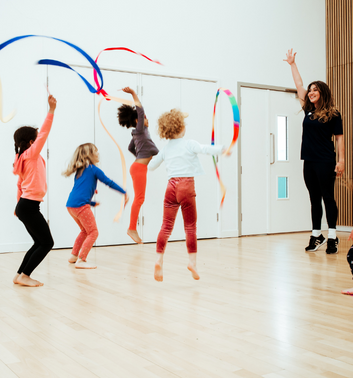
Make strides by trying running this summer
Whether it’s part of athletics training or a recreational jog with family or friends, running is free and provides great cardiovascular exercise for children of all ages.
Kids simply need a good pair of running shoes and they can start by jogging around the local park or joining a local Park Run.
Make it a bit easier and walk sections of the route, before building up to running the entire distance. The more people who join in, the more enjoyable it becomes, especially in winter when the weather can be a little off-putting.
It’s free, challenging and a healthy hobby that can stick with a child for life.
Will rugby be a touchdown for your child?
Up to the age of 9, rugby is a non-contact sport so touch or tag rugby is played. Touch rugby involves the usual rules of rugby but with one crucial difference – no tackling. Children have to grab a tag attached to the waistband of their opponent in order to gain possession of the ball.
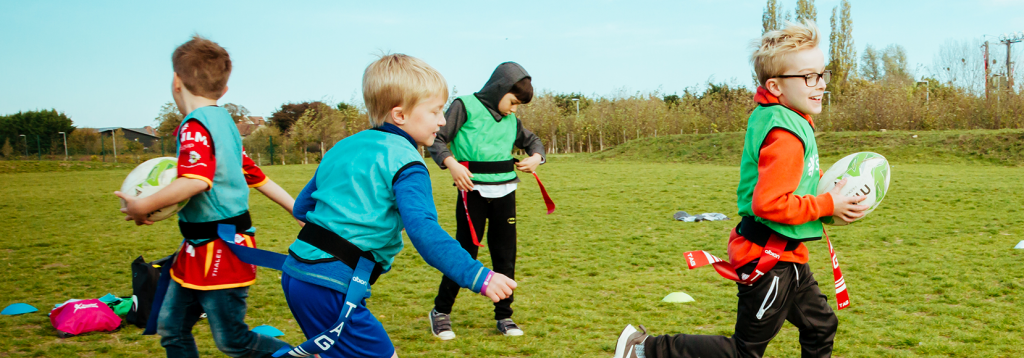
As well as teaching hand-eye coordination and catching a ball, rugby helps children learn attributes such as respect, concentration and self-control. It harnesses a sense of belonging and assists with the development of skills such as problem-solving and critical thinking. It may typically be a seasonal, winter sport, but activity groups will run year-round.
Fall in love with racket sports
Developing a love of racket sports is a sensible pastime because it not only stimulates both the body and mind but games can be played all year round.
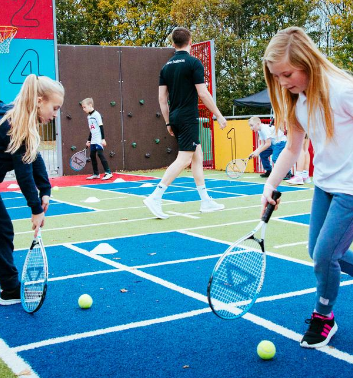
Playing tennis is fantastic for overall fitness, mental strength, tactical thinking and agility, and fortunately, after-school clubs are relatively accessible all over the country.
Played indoors during the cooler months and outdoors on grass or astro courts over summer, tennis provides a hobby that a child can follow consistently throughout the year. It’s also really enjoyable to watch their progress!
If you can’t play tennis, table tennis is a superb sport to play over the winter months. Tables are generally indoors and available at leisure centres or youth venues. All you need is an opponent!
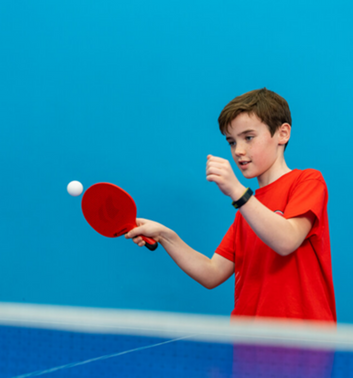
Batter up for baseball!
Baseball is growing in popularity in the UK and for good reason.
As a team sport, baseball is great for teaching teamwork, especially since every player on the pitch plays a role. What’s also intriguing is that it nurtures patience, focus and concentration, because children are expected to wait their turn or stay focused in the game even if they are not batting or running bases. The game develops gross motor skills and is superb for teaching mental resilience.
The baseball bat is slightly different in shape and length to the rounders bat, so it’s worth investing in a couple if possible. However, you can still use rounders balls and bases to keep costs down.
Try replacing rounders with baseball, using it as an opportunity to profile a different fun sport and expand the kids’ sporting knowledge.
Top tips for encouraging your child to try a new sport:-
- Be open-minded – football or cycling may be their favourite but they should try something new!
- Seek out open days or trial sessions before signing up for a course.
- Play games together as a family – collectively try your hand at something new.
- Remember the benefits of keeping active – improved physical and mental health.
- Play a new sport and your kids will often meet new people and make new friends.
- Explore new hobbies in after-school clubs (you’ve got a term to see if your child enjoys it).
- Play a sport and it’s time spent off devices and technology.

